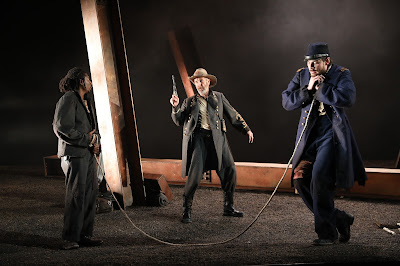The History Behind Father Comes Home: Black Americans in the Civil War
By Elspeth Sweatman and Simon Hodgson
As soon as the first shots rang out on April 12, 1861, the American Civil War was classified, glorified, and romanticized as a white man’s war. The voices of the nearly four million Black Americans, more than 90 percent of whom were enslaved, were erased. It is their voices that playwright Suzan-Lori Parks re-earths in Father Comes Home from the Wars (Parts 1, 2 & 3), bringing us face to face with a painful, complicated, and shameful aspect of America’s history, one with which we are still coming to terms.
While it was the battlefields that captured public attention, in a war where railroads, large-scale manufacturing, and logistical campaigns were as vital as soldiers, no Black American survived untouched. Toiling away as laborers, miners, hospital porters, and factory workers were 3.5 million free and enslaved Black people. Some free men volunteered for this dangerous war work, wishing to defend their city or state. But they frequently worked side by side with enslaved men who were impressed, conscripted, or simply offered up by their owners.
In 1863, President Abraham Lincoln relented to pressure from abolitionists and Black civic leaders and allowed Black Americans to enlist in the Union Army. Over the next two years, 180,000 would serve in the army and see action on more than 50 occasions. Despite proving themselves on the battlefield, Black Union soldiers faced inequality in the provisions and medical care that they received, the promotion opportunities that they were offered, and the punishments that they received. If captured by Confederate soldiers, they faced execution or the terror of being sold into slavery.
 |
|
Regiment Sergeant A. M. Chandler and his enslaved body servant, Silas Chandler. Photo courtesy Library of Congress. |
Although slavery was technically abolished in the United States in December 1865, Black Americans have continued to face systemic discrimination, racism, and prejudice. The threat of violence, torture, and lynching, as well as the Jim Crow laws—dehumanizing legislation passed in many Southern states that systematically kept Black Americans in de facto slavery—were daily reminders of the limitations of their “freedom.” Even now, 50 years after the passing of the 1964 Civil Rights Act, millions of Black Americans struggle to gain equal access to housing, healthcare, education, social services, fair treatment within the judicial system, and the opportunity to participate in America’s political system. For millions of Black Americans, the question of what it means to be free in America is yet unanswered.


